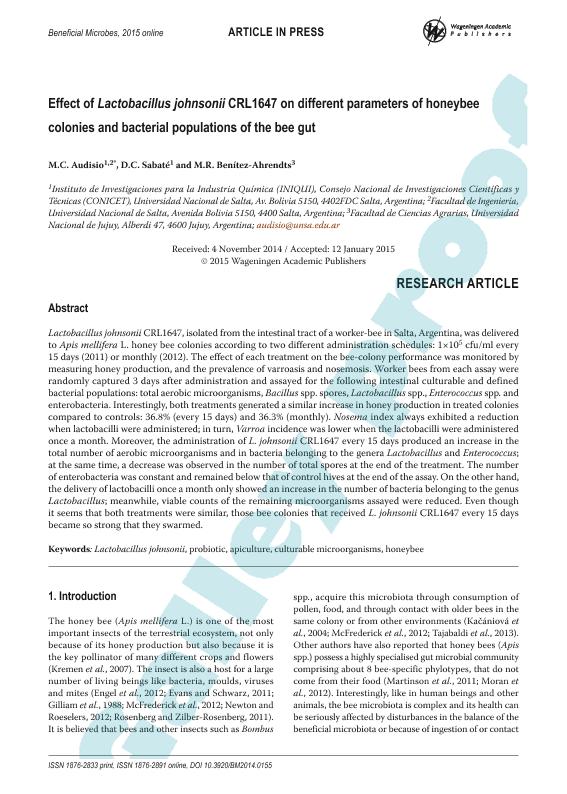Mostrar el registro sencillo del ítem
dc.contributor.author
Audisio, Marcela Carina

dc.contributor.author
Sabate, Daniela Constanza

dc.contributor.author
Benitez Ahrendts, Marcelo Rafael

dc.date.available
2017-08-10T19:41:52Z
dc.date.issued
2015-01
dc.identifier.citation
Audisio, Marcela Carina; Sabate, Daniela Constanza; Benitez Ahrendts, Marcelo Rafael; Effect of Lactobacillus johnsonii CRL1647 on different parameters of honeybee colonies and bacterial populations of the bee gut; Wageningen Academic Publishers; Beneficial Microbes; 6; 5; 1-2015; 687-695
dc.identifier.issn
1876-2833
dc.identifier.uri
http://hdl.handle.net/11336/22133
dc.description.abstract
Lactobacillus johnsonii CRL1647, isolated from the intestinal tract of a worker-bee in Salta, Argentina, was delivered to Apis mellifera L. honey bee colonies according to two different administration schedules: 1×105 cfu/ml every 15 days (2011) or monthly (2012). The effect of each treatment on the bee-colony performance was monitored by measuring honey production, and the prevalence of varroasis and nosemosis. Worker bees from each assay were randomly captured 3 days after administration and assayed for the following intestinal culturable and defined bacterial populations: total aerobic microorganisms, Bacillus spp. spores, Lactobacillus spp., Enterococcus spp. and enterobacteria. Interestingly, both treatments generated a similar increase in honey production in treated colonies compared to controls: 36.8% (every 15 days) and 36.3% (monthly). Nosema index always exhibited a reduction when lactobacilli were administered; in turn, Varroa incidence was lower when the lactobacilli were administered once a month. Moreover, the administration of L. johnsonii CRL1647 every 15 days produced an increase in the total number of aerobic microorganisms and in bacteria belonging to the genera Lactobacillus and Enterococcus; at the same time, a decrease was observed in the number of total spores at the end of the treatment. The number of enterobacteria was constant and remained below that of control hives at the end of the assay. On the other hand, the delivery of lactobacilli once a month only showed an increase in the number of bacteria belonging to the genus Lactobacillus; meanwhile, viable counts of the remaining microorganisms assayed were reduced. Even though it seems that both treatments were similar, those bee colonies that received L. johnsonii CRL1647 every 15 days became so strong that they swarmed.
dc.format
application/pdf
dc.language.iso
eng
dc.publisher
Wageningen Academic Publishers
dc.rights
info:eu-repo/semantics/openAccess
dc.rights.uri
https://creativecommons.org/licenses/by-nc-sa/2.5/ar/
dc.subject
Lactobacillus Jhonsonii
dc.subject
Probiotic
dc.subject
Apiculture
dc.subject
Culturable Microorganisms
dc.subject
Honeybee
dc.subject.classification
Bioquímica y Biología Molecular

dc.subject.classification
Ciencias Biológicas

dc.subject.classification
CIENCIAS NATURALES Y EXACTAS

dc.title
Effect of Lactobacillus johnsonii CRL1647 on different parameters of honeybee colonies and bacterial populations of the bee gut
dc.type
info:eu-repo/semantics/article
dc.type
info:ar-repo/semantics/artículo
dc.type
info:eu-repo/semantics/publishedVersion
dc.date.updated
2016-12-16T16:42:38Z
dc.identifier.eissn
1876-2891
dc.journal.volume
6
dc.journal.number
5
dc.journal.pagination
687-695
dc.journal.pais
Países Bajos

dc.description.fil
Fil: Audisio, Marcela Carina. Consejo Nacional de Investigaciones Científicas y Técnicas. Centro Científico Tecnológico Conicet - Salta. Instituto de Investigaciones Para la Industria Química. Universidad Nacional de Salta. Facultad de Ingeniería. Instituto de Investigaciones Para la Industria Química; Argentina
dc.description.fil
Fil: Sabate, Daniela Constanza. Consejo Nacional de Investigaciones Científicas y Técnicas. Centro Científico Tecnológico Conicet - Salta. Instituto de Investigaciones Para la Industria Química. Universidad Nacional de Salta. Facultad de Ingeniería. Instituto de Investigaciones Para la Industria Química; Argentina
dc.description.fil
Fil: Benitez Ahrendts, Marcelo Rafael. Universidad Nacional de Jujuy. Facultad de Ciencias Agrarias; Argentina
dc.journal.title
Beneficial Microbes
dc.relation.alternativeid
info:eu-repo/semantics/altIdentifier/doi/http://dx.doi.org/10.3920/BM2014.0155
dc.relation.alternativeid
info:eu-repo/semantics/altIdentifier/url/http://www.wageningenacademic.com/doi/10.3920/BM2014.0155
Archivos asociados
